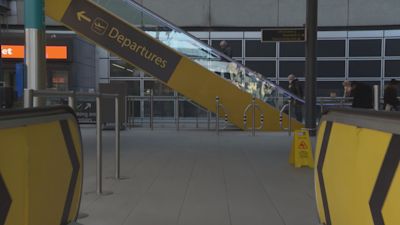South's travel industry receives a boost as Covid testing rules are relaxed

Watch reaction from the travel industry in the south in James Dunham's report
The Government has announced huge changes to travel restrictions which will provide a boost to airline and ferry operators in the South.
Pre-departure Covid tests for travellers heading to England are being scrapped, and rules around the post-arrival test are being relaxed too.
Officials have been reviewing the measures introduced at the end of November after the Omicron variant emerged from South Africa. The rules were tightened in December, with all passengers told they myst get a pre-departure test and negative result before arrival in the UK.
It's hoped the changes will allow people more confidence to make bookings as we head out of the winter and into the summer.
Easyjet have told ITV News they'll have the same capacity as back in 2019, which is welcome news for Gatwick Airport.
At Gatwick on Wednesday (5 December) passengers had mixed feelings about pre-departure testing, with some seeing it as a reassuring measure.
Gatwick passengers react to changes to travel restrictions
The travel changes are among a string of announcements on Covid measures announced by the Government on Wednesday, led by Boris Johnson scrapping PCR testing requirements for people without symptoms.
The Prime Minister announced on Wednesday people without symptoms no longer had to get the tests, as Omicron cases soared above 200,000 daily nationwide, and the UK grapples with pressure on lateral flow test supplies.
The supply of rapid tests was squeezed in the lead-up to Christmas, when the Government announced people in England with Covid could end self-isolation if they return two negative tests on both day six and seven.
Northern Ireland and Wales have since followed suit.
Robert Griggs, from Airlines UK, the body representing companies such as TUI and Easyjet, told ITV News Meridian testing continues to restrict passengers as airlines try and recover.
He said: "It's been a really difficult two years. I think the priority for airlines is that they are looking ahead and planning for the summer 2022. It takes months of preparation and planning to do that, you have to train staff and we have to try and make sure aircraft are ready. And when you have the testing and knee jerk reactions to travel, the restrictions put in at short notice, it makes it really hard to do that planning.
"The danger is that just don't have the people in place to skills the aircraft able to meet that demand when it comes in the summer, which would be bad for the UK economy, it's bad for airlines and for those looking to travel.
"At the moment, travel feels like it's being singled out for more restrictive measures than other parts of the economy.
"So that's why for us, it's really important we move away from testing. We support the red list and we have consistently supported that as the way to tackle variants of concern. We've seen that it can be effective pretty early on, but testing gets less effective as the virus moves around.”
Robert Griggs, Airlines UK
Despite testing being relaxed here, other countries like France, still have travel bans in place for people from the UK.
Passengers are advised to check the rules on their chosen destinations before booking a trip.
Dr Sarah Pitt, Virologist at the University of Brighton said, "We know that, perhaps, one in three people have either no symptoms or very mild symptoms, but still have an active Covid infection, and can be infectious to other people.
"You don't really want to be sitting on a plane along with someone for four hours, who has the virus and who is infectious for that time.
"I don't think that would be a very good idea."